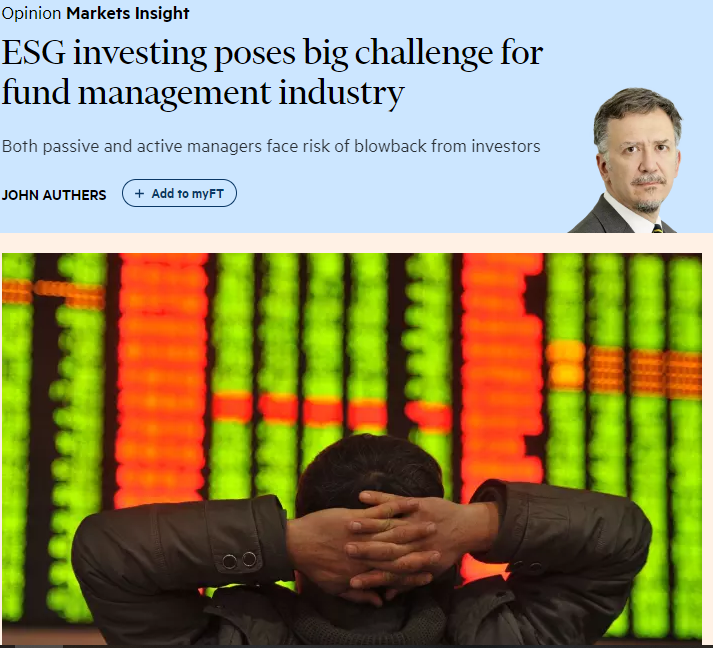The Financial Times rates John Authers’ journalism as ‘premium subscription’ quality, so it was a rare and welcome opportunity to see his ‘Opinion – Market Insights‘ piece aired in the mainstream edition yesterday (31st May). This should reach as wide an audience as possible because it has very serious implications for the future of market based capitalism as we know it.
Authers raises the very topical issue of fund managers having to recognise and respond to increasing interest in ESG based investments (which cover Environmental, Social & Governance factors). It is well worth a read but I took issue with one of his statements that “First, for now, there are no agreed ESG standards…”. I would not expect Authers to know about the Maturity Institute (although we have made many contributions to other articles in the FT), or about our measure of Total Stakeholder Value TSV, so I set out to inform and educate; one of the key roles of MI.
As you can see from the ‘Comments’ this generated between Authers and me (below) the new paradigm of TSV can come as quite a shock to seasoned FT journalists. It is a completely diferent frame of reference. However, the shock should be very short-lived, or at least mitigated, when we are able to explain our mature perspective. TSV already incorporates ESG factors but goes much further in linking them directly to the valuations of companies and their performance. If the ESG ‘industry’ does not understand and acknowledge this point, and set its own standards accordingly, then its potential power as an aid to mainstream investment decision making will fail to materialise.
FT Comments
Paul Kearns
“For now, there are no agreed ESG standards…” As the chair of the Maturity Institute I beg to differ – http://www.hrmaturity.com/establishing-a-new-gold-standard-in-company-valuation/ – and these standards can be used to rate entire economies http://www.hrmaturity.com/value-scotland-a-national-programme-to-improve-organisational-maturity/
John Authers, FT @Paul Kearns
The operative word is “agreed”. How many people have agreed to apply your standards? Plenty of people are trying to draw up ESG standards and have published them. I’m sure yours is as interesting as many others. But are you really telling me that everyone means the same thing when they talk about “ESG” and that everyone can agree on which companies comply with ESG criteria and to what extent?
Paul Kearns @John Authers, FT
No, the operative word is ‘standard’ – a poorly conceived standard can achieve widespread agreement and yet be meaningless unless there is a common definition of the end goal of value that can simultaneously satisfy the needs of investors and society at large. Many in the ESG community still hold to the fallacious and incoherent notion of a ‘triple bottom line’. Maturity Institute members subscribe to our ultimate, composite, measure of Total Stakeholder Value, underpinned by the very highest professional standards of whole system management. When we present TSV to investors they find it very compelling because it captures financial and societal value in a single, coherent metric that reveals the real value of corporations today. http://www.hrmaturity.com/truly-responsible-investors-fuse-social-mission-with-corporate-performance/
John Authers, FT @Paul Kearns
I wrote it and the operative word was “agreed.” There are no agreed standards. And lots of people who think they have well-conceived standards. At the point that your standards are widely adopted, I will agree with you. For the time being, I don’t.
Paul Kearns @John Authers, FT
John, your article touches on two hugely important issues – challenging orthodoxy and how to replace it with a superior paradigm. Jack Welch, Fortune’s ‘CEO of the century’, was a prime mover in establishing the current orthodoxy of shareholder value. He later called this “the dumbest idea” – in the FT – but he never offered a better, workable alternative. ESG is currently best described as a bandwagon – increasing its rank and file subscribers does not provide convincing validation of its measures (you’re right, it doesn’t have any agreed standards). The Maturity Institute (MI) was established as a professional, evidence-based, research and development institution that applies the scientific method to what the financial and investment communities still, quaintly, refer to as ‘intangibles’. MI’s membership is currently very small because we started from a point of brand new enquiry into organizational value and risk. The quality of our membership is therefore much more important to us than its quantum. We consciously chose to challenge the power of ‘shareholder primacy’ and set out to develop a better paradigm of societal value. We measure this as TSV. We have a particular interest in, and focus on, human capital because the extant ‘professional’ bodies, that are supposed to know something about this, are really just another set of bandwagons whose members have never, truly, questioned the efficacy of their methods. http://www.hrmaturity.com/?s=CIPD We are not actively seeking new members at the moment John but if you want to learn more about us, and actively help us to shift the paradigm through your writing, then I would welcome your application.

Comments are closed